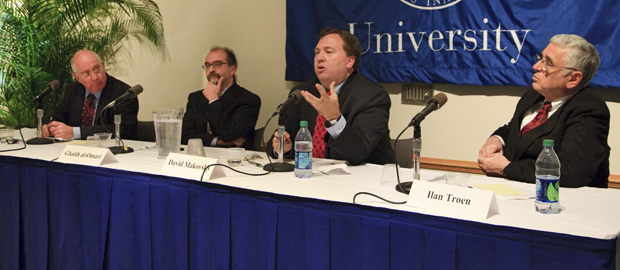A passionate call for civility in Mideast and on campus
Expert analysts of peace process say overreactions must be contained
 Photo/Heratch Ekmekjian
Photo/Heratch EkmekjianFrom left, Crown Center Director Shai Feldman, Ghaith al-Omari of the New America Foundation, David Makovsky of the Washington Institute and Schusterman Center Director Ilan Troen.
No matter what happens in New York, all concerned with the region must plan for “what’s going to happen the next day,” al-Omari said. “The Palestinians will remain on the ground. The Israelis will remain on the ground. And the two-state solution will still be in the best interests of the Palestinians, the Israelis, the United States and the international community.”
Some people on both sides will be angry regardless of the results in New York, he said, and grandstanding politicians will fan that anger, so “how do we guarantee that it does not slide back into violence?”
There is also a danger of deepened antagonism between supporters of Palestinians and Israelis on American campuses, many of which already are extremely polarized, the analysts said.
“At a time when people on the ground, Israelis and Palestinians, are talking, it is important that you, here, talk,” said al-Omari, of the American Task Force on Palestine, who has served in numerous senior position in the Palestinian Authority. “It is not right for someone to say that Jews have no connection to Israel. It is not right for someone to say that Palestinians are not a people.”
Makovsky, who is director of the Project on the Middle East Peace Process at the The Washington Institute, said that people often forget how far the situation has progressed from the days when Israeli Prime Minister Golda Meir declared there was no such thing as a Palestinian people and most major Arab leaders were vowing to drive the Israelis into the Mediterranean Sea.
He said he and al-Omari have visited dozens of campuses “to drive home this idea of civility among the differences. How can it be that people can sit together in the Middle East and they can’t sit together in the Northeast? The challenge is to be pro-Palestinian without being anti-Israeli and to be pro-Israeli without being anti-Palestinian.”
Both Makovsky and al-Omari saluted the institution-building efforts of Palestinian Prime Minister Salam Fayyad, which the analysts said have given the international community, some Israelis and many Palestinians heightened confidence that the Palestinians are prepared to run their own government and maintain peace with Israel.
“Today, the IDF [Israel Defense Forces] is the strongest advocate for the Palestinians,” al-Omari said, because under the current Palestinian administration there has been an extended period of security cooperation and genuine professionalism among Palestinian officers.
However, Makowsky warned, the bottom-up efforts of Fayyad to create peaceful and progressive conditions in the region will not be sustainable if there is not concrete progress toward Palestinian statehood.
The work being done – creating civil institutions, nurturing civil society, cooperating with Israel on security issues – “is being packaged as state-building,” Makovsky said. “At some point, bottom up has to meet top down.”
If Palestinian leaders seek and receive a UN General Assembly vote endorsing specific boundaries, or heightening the capacity of Palestinian officials to level charges of illegality against Israel and Israelis, negotiations for that state will become more difficult, Makovsky said. On the other hand, he added, if Fayyad’s approach yields little or nothing at the UN, “the day-after” might not be containable.
A number of diplomatic avenues that could produce better results are being pursued actively by various concerned parties, he said.
“The day-after is as important as whatever happens in New York,” Makovsky said. “If we don’t deal with it, things could get torn apart…. The alternative to [Palestinian President Mahmoud] Abbas and Fayyad is not the Hadassah of Brookline. It is Hamas.”
The event was co-hosted by the Schusterman Center for Israel Studies and the Crown Center for Middle East Studies. The program was introduced by Schusterman Center Director Ilan Troen and the Q&A session following the analysts’ prepared remarks was moderated by Crown Center Director Shai Feldman.
Categories: International Affairs






